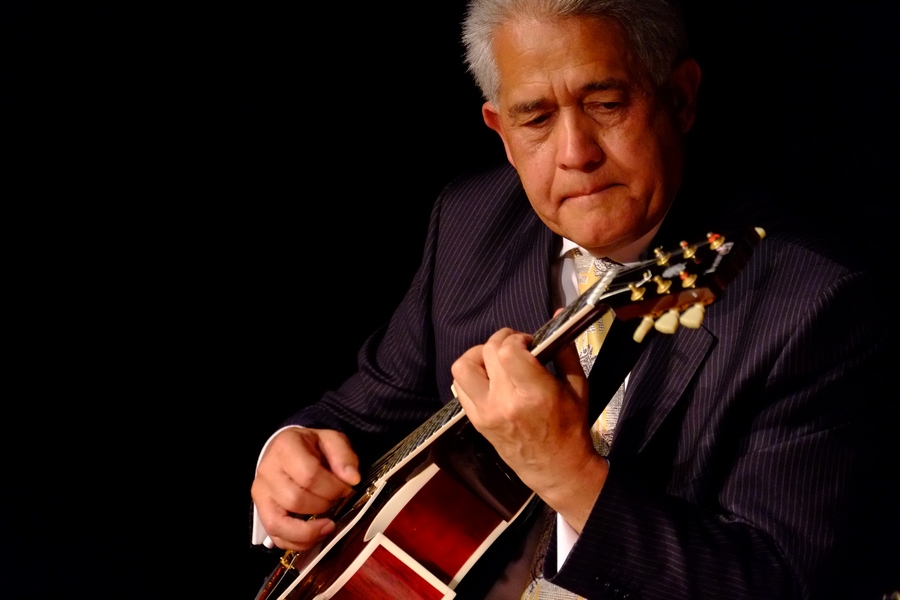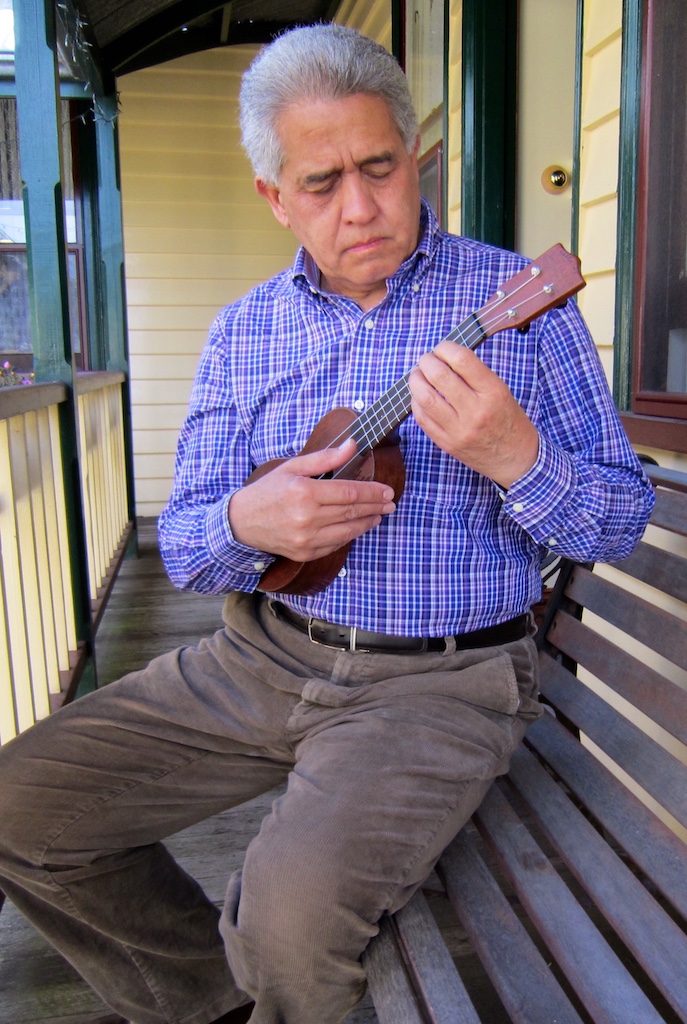From articles and books, interviews and face-to-face meetings it is clear that as with people in other walks of life jazz musicians are not all alike. Among all the different types there are a few who are forthright, even aggressive, in promoting themselves. There are also a few who are so self-effacing that they become virtually invisible. Chuck Morgan was firmly in this second category.
Avoiding publicity, declining opportunities to make own-name records, he nevertheless had an extensive career in several genres, appearing as sideman in jazz concerts internationally, playing in studio orchestras, and appearing on numerous albums. On all of these occasions fans and fellow musicians everywhere were deeply impressed by his quiet and friendly demeanour. Even more impressive was the extraordinarily high standard he set whenever and whatever he played.
Born into a very musical family in Auckland, New Zealand, on 28 June 1952, Richard “Chuck” Morgan was of Maori/European heritage. His father, Howard, played guitar and piano and occasionally sang, his mother sang and played ukulele, and several uncles and aunts were musicians, including John and Millie Bradfield, who performed as a double act, and Richard who played semi-professionally as a blues artist. Chuck and his eight siblings were encouraged to play, most of them choosing guitar or ukulele or banjo.
Initially taught by his father and then by his uncle John, Chuck’s instrument was the guitar. Other members of his immediate family who became professional musicians include a sister, Carolyn, who sang with pop group Charisma, a brother, Howie, who played electric bass with various bands, and another brother, Peter, who worked as singer and multi-instrumentalist with various groups, including Charisma, before becoming a successful bandleader and solo artist.
After studying electronics, Chuck, who had taught himself to sight-read, turned to a full-time career in music. Becoming a member of the Television New Zealand Orchestra and the Auckland Radio Orchestra, he played on-screen, on tour and on record. During this time he worked under Russ Garcia during the American arranger’s residence in New Zealand. Additionally, he played with several jazz groups.
He had married young and with a family to support – he eventually had six children – he turned down the offer of a scholarship at Indiana University in the USA. Moving to Sydney in the mid-1980s, he quickly became a respected teacher and an established figure on the Australian music scene, often playing with leading jazz musicians. Among the artists with whom he played are Dan Barnett, Billy Field, Paul Furniss, Don Rader, Tom Baker, Bob Barnard, Marie Wilson and Graeme Bell.
It was also in Sydney that he met singer-pianist Janet Seidel, with whom he was to have a hugely successful partnership. This was at the end of the 1990s and they first recorded together in 1999 and from 2000 on they became known internationally, mostly performing in trio with Janet’s brother, bassist David Seidel. During these years, although adept on several stringed instruments, Chuck mostly played guitar but from around 2005 he was heard increasingly on ukulele.
From around 2005, Chuck Morgan usually played a Maui Music concert ukulele he bought in Tokyo but he also played a Martin Soprano Type 1. In an interview with the Japanese magazine Rolling Coconuts he recounted finding this 1927 instrument in a vintage guitar shop on London’s Denmark Street, commenting that although smaller it had a big sound. In this interview, he said that this particular ukulele appeared to be part of the estate of Tui Lorraine. A New Zealander, probably of Maori descent, she had been a friend of silent movie star Clara Bow and there was a possibility, he added, that the instrument had been the property of Bow.
‘He said that having played guitar more than ukulele in his career he was discovering “secrets of the uke every time I try to play it”‘
Chuck discussed technicalities, saying that although he sometimes used wooden guitar picks he customarily used “thumb and finger style in a harp like fashion”. He went on to say that because of its small size, “a soprano ukulele needs more careful technique than a guitar in order to produce a clear sound from the fretboard. The unusual tuning – G4 (4th string), C4 (3rd), E4 (2nd), A4 (1st) and small tonal range – from C4 (middle C) to A5 – means that 4-string guitar chord shapes that can be played on ukulele are inverted and will sound different. The fact that the 4th string is higher than the 2nd or 3rd means that it is never the lowest pitch (as it is on the guitar). This means that voicings available on the ukulele are pretty much impossible on the guitar”. He added that having played guitar more than ukulele in his career he was discovering “secrets of the uke every time I try to play it”.
Playing concerts and club engagements in Australia and New Zealand, Japan and Europe, the trio of Janet, Chuck and David gained a highly appreciative following. Thanks to Janet’s love for the great standards, their audience was wide, including as it did fans of popular song, cabaret and jazz. Their appeal to jazz fans stems in part from the fact that, instrumentally, all three musicians were highly skilled, but jazz needs more than that. Improvisation is required and before that understanding is needed, not only intellectually but emotionally. In Janet, Chuck and David all of these qualities were in abundance.
During these years they recorded several excellent albums, most of them on La Brava Music, a label founded and jointly owned by Janet and David. Among them is Charade (La Brava LB0077), on which they perform a selection of songs by Henry Mancini. On this session, Janet doesn’t play piano; that role is taken Joe Chindamo, and also on the session is drummer/percussionist Fabian Hevia. Several of the songs were written for films – Charade, Darling Lili, The Party, Two For The Road, and Days Of Wine And Roses.
An album especially interesting for Chuck’s ukulele playing is Moon Of Manakoora (La Brava LB0068), which won the Bell Award for Best Australian Jazz Vocal Album in 2006. Chuck’s playing is light and fluid and his (sadly few) solos are inventive and excellent. Among the songs are When Lights Are Low, Till There Was You, Linger Awhile, April In Portugal, Deep Purple, Falling In Love Again, Twilight Time, Whispering and, of course, Moon Of Manakoora.

Another album with a larger gathering of instrumentalists is Far Away Places (Antipodes Records AR 101). On this live date, in addition to Janet, David and Chuck are Hamish Stuart and Fabian Hevia (pc), Bob Henderson (t), Paul Furniss (cl), Ben Jones (ts), and Mitchell Morgan (soprano uke). The songs heard include La Paloma, Too Darn Hot, Take The ‛A’ Train, Sand In My Shoes, Autumn In New York, Midnight Sun, Far Away Places and Golden Slumbers.
In 2007, the trio was recorded live in Adelaide at a festival of cabaret. On the ensuing album, We Get Requests (La Brava LB0075), the song selection ranges through romantic (A Nightingale Sang In Berkley Square and They Can’t Take That Away From Me), to whimsical (My Attorney Bernie and Your Feet’s Too Big) and evocative (Cry Me A River and Foggy Day).
By now, the relationship between Janet and Chuck had extended into their private lives and in this and in their musical partnership they appeared to have a rich future. But then, early in 2017, Janet was diagnosed with ovarian cancer. She died on 8 August 2017 at the age of 62. The following year, Chuck had surgery planned for a heart condition but he suffered a stroke and a heart attack and then spent several months in care before dying on 23 August 2018. He was 66.
‘There are a very, very few instrumental recordings of him, which is quite crazy but he just wouldn’t do them! Maybe three or four’
During 2018, David Seidel selected songs Janet had recorded over the years and released an album in tribute to his sister. Inevitably, listening to You Are There (La Brava LB 0082) is a mixed experience. On one level, on songs such as The Very Thought Of You, What Are You Doing The Rest Of Your Life?, Night And Day and You Are There, Janet vividly demonstrates her love for the music as well as her superior vocal skills. On another level it is a sad reminder of how much was lost with her much too early death.
Now, in 2019, David is preparing another album on which he will present Janet and Chuck in a selection of tracks that will display not only Janet’s love of music but also the love and instrumental skill Chuck brought to his playing. Unfortunately, as David says, “There are a very, very few instrumental recordings of him, which is quite crazy but he just wouldn’t do them! Maybe three or four, but there are several unreleased tracks with Janet that feature him”.
In preparing this article I have had invaluable help from David Seidel and it is appropriate that he brings it to a close:
“It is no joy being the last one still standing of our trio, the sum of which was doubtless greater than the individual parts. Chuck and I shared a passion for playing the best we could, in particular to accompany a vocalist. Chuck’s musical strengths were applied mostly to his self-effacing approach to listening and contributing just the right thing in combination with whoever was playing or singing. We often talked about this and the concept of a trio as a trinity or a triangle with three equal points of balance. The bass at the bottom, the harmony alongside and the voice as the pinnacle – the focus above but underpinned. Each part makes up the whole.
“His constant theme whenever he played was musical communication – in other words the way musicians respond to each other in an unspoken way when everyone is listening! This is a prerequisite for good music, no matter what the genre. Chuck was such a warm and friendly, gently-spoken person who had an obvious and prodigious musical talent, experience, intellect and technique, but was modest and happy to encourage musically and personally his family, students and fellow musicians. This was his life and he leaves none of us untouched from knowing him”.
Additionally, I was aided by John Robert Brown and have referred to a number of sources for information. These are: petermorganmusic.com, rollingcoconuts.com, Bill Haesler’s Chuck Morgan obituary, and La Brava Music’s website.
















